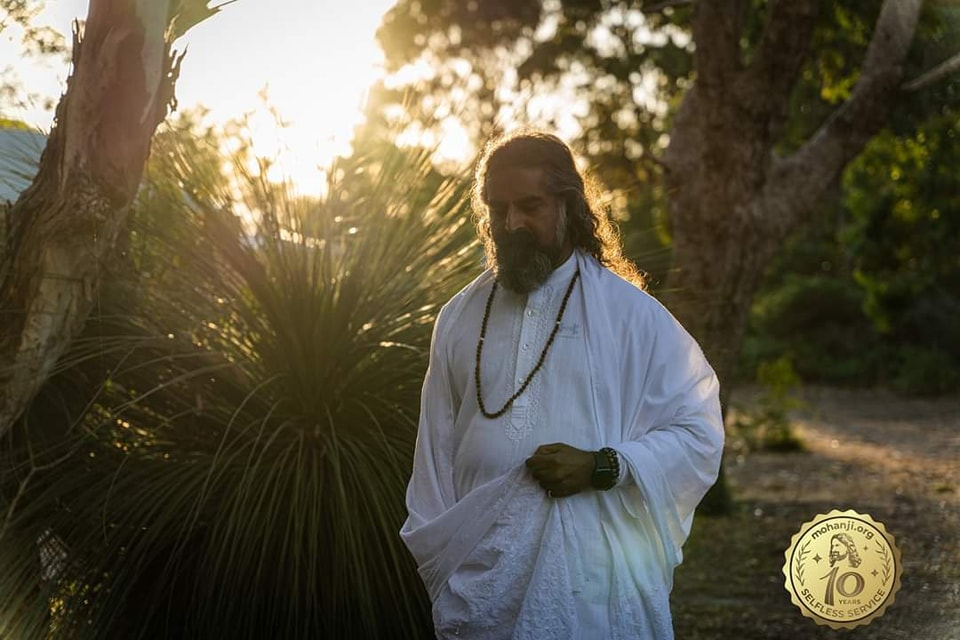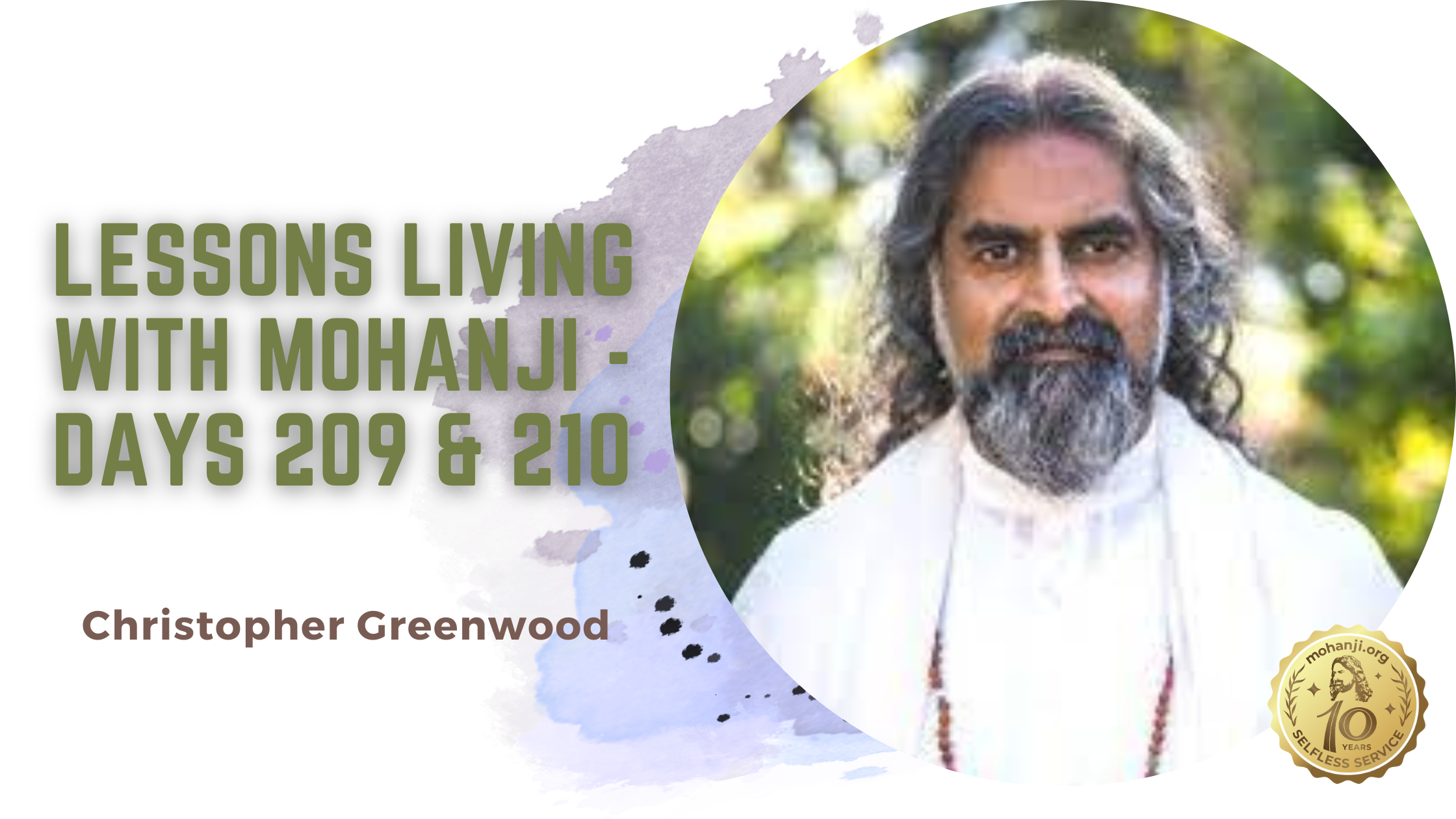By Christopher Greenwood
Day 209 – Give attention to what comes to you
I’ve mentioned before in some messages about how alert, aware, and always active Mohanji is relating to all the tasks that we’re conducting across the world. One of the things related to that, which still amazes me, is that the right information reaches him at exactly the right time. This could be in the form of a message or video, or maybe he’s just browsing something or something that catches his attention. But always, he seems to have this ability to act on the things that need attention immediately.
So, Mohanji is handling many activities across the world. We’re across five continents now, eighty countries, and growing. But despite that, he has a firm hand on the reins, and if there is anything that could slow down, derail, or ignite severe problems, he acts immediately; he doesn’t wait. This has been a lesson, actually, which I’ve learned the hard way a few times.
So, this can be a simple message, more of something that is posted on one of the pages or Facebook or something else. But whilst he gives full responsibility to those in charge, when something reaches his eyes, he acts immediately because he works on the premise that if something reaches him, then it’s asking for his attention. He never lets anything go, and he isn’t passive about seeing a problem, issue, or something like that. Immediately, he acts.
This was a good lesson for me because, especially moving into a place, from maybe some indifference towards certain things, or having passivity towards situations, on what I’d seen. It only took him a few times to ask me, “Have you seen this?” So, he would present it to me, and then I’d say, “Yeah, I’d seen that,” and then he would say, “Well, why didn’t you do anything about it? Do you not see what this could become? What this can be?” So, for me, these were seemingly small things.
But at that time, the intensity with which he would show this to me would be incredible. It’s difficult to explain that feeling when Mohanji takes an intense form, but it’s always to shift something. At that time, it was the move from that type of inertia and being passive to making sure that I was always being alert and aware, and if something reaches my attention, then perhaps it’s meant to reach my attention, so I should act.
As mentioned before as well, and as I’ve shared in other messages, we can’t be passive. Being passive sometimes is just as bad as taking part or being involved in an event that might not be good. Seeing something and not doing something about it really isn’t an option for Mohanji, especially if it has some potential complication for the work that we’re doing. This has been a good learning experience because now I look to include the same principle.
Although I might not have a view across everything, and can’t keep minute-to-minute track of everything that I’m involved in, if something comes to my attention, then I at least make sure I acknowledge that, and even if I need to act on it, because in most cases, it’s a warning or something that really does need attention, and if ignored, it could develop into something else.

Day 210 – Story Shared By Mohanji: The master and the young archer (patience, maturity and stability)
Yesterday, as we were driving in the car, Mohanji shared with us a story, which I believe is from one of the ancient scriptures in India. I don’t know the names of the characters. But he shared this as another one of those great stories, which in today’s modern times can have its meaning distorted. This has the themes of stability, patience, and maturity.
The story starts with a group of archers who are being trained by their master at the edge of a forest clearing, and then there are the deep woods just next to them. They are practising and training, and the dog’s barking very loudly, very noisily, and then eventually, the dog sees something in the forest and runs into the forest barking. After some time, the dog comes back to the group, and its mouth is completely shut with arrows. Many arrows have been fired into the dog’s mouth so that, like a sandwich, it can’t open its mouth, it can’t bark, but at the same time, it’s still alive. It’s not completely harmed.
The master sees this, and he’s curious, so he starts shouting out to the forest, “Who’s there? Come, show yourself.” After some time, a young tribal boy comes out of the forest with his bow and his arrows, and the master speaks to him. He said, “You’ve done an amazing job. How is it that you could silence that dog without actually killing it?” The young tribal boy said, “I learned all this from you,” and the master was confused. He said, “But when did I teach you?” He said, “When you were doing all these classes here. Whilst you were practicing here each day, I’ve been watching from the forest because I could never afford or it would not be possible to be with you because I’m a tribal person, and you may not take me as your student.”
The master was really, really surprised, and he said, “Well, you’re better than all of my students; you’ve done great. But please tell me, how is it that you shoot the arrow.” So, the tribal boy got his hand up, and he showed him with his hand: “Look, I do it here. I have my thumb, and then I have this thing…” The student was really happy that he’d finally got to meet and speak with the master. Out of reverence and respect, he says, “What can I give? You’ve taught me all this, although I haven’t been directly in your class; whatever you ask, I’ll give you whatever I have.” So, the master said, “Okay, I want your thumb.” Taking the thumb meant he was no longer going to be able to shoot the arrow.
So, that’s the story that Mohanji shared, and it can sometimes be confusing in these modern times. People will think that that’s discrimination, that the teacher is bad. But later, actually, when the master went back to the group, they asked him, “Why did you do this? Why did you take his thumb?” The master said, “It’s because I’m teaching you all these techniques so that you’ll not attack anybody. Self-defence is okay, but we’re not training to attack, and for that, we need one quality: patience, extreme patience, because people who fight and people who attack are imbalanced people.
Balanced, stable people, who are self-sufficient and in control of themselves, will not attack. That’s the minimum quality that my students should have. They should not attack. They can defend themselves. He attacked this poor dog, which could be any dog that’s just barking. What’s in a bark? It’s not a bite. I understood that this man could use his skill for offence, and I can’t allow any of my students to have offence in them because I carry that responsibility. I carry their karma.”
He said, “That’s the reason why. I fully appreciate his talents and fully like him, but he’s not mature. A true warrior should not fight. He can have all the talents but should be very patient. Then if somebody attacks, they can defend. They can defend the country, they can fight, and in extreme cases, kill. But a dog was barking… Why would you shoot an arrow? That’s why I took the thumb.”
This story, as it comes from ancient times, really is one of developing maturity. It’s also sharing that those who practice the scriptures, they’ll never kill, they’ll never offend, and they won’t harm anybody. People definitely shouldn’t harm for the sake of fun. I really enjoyed this story and wanted to share it with you.

|| JAI BRAHMARISHI MOHANJI ||
Edited & Published by – Testimonials Team, 16th April 2023
Disclaimer:
The views, opinions, and positions expressed by the authors and those providing comments on these blogs are theirs alone and do not necessarily reflect the views, opinions or positions of Mohanji, Mohanji Foundation, it’s members, employees or any other individual or entity associated with Mohanji or Mohanji Foundation. We make no representations as to accuracy, completeness, timeliness, suitability or validity of any information presented by individual authors and/or commenters on our blogs and will not be liable for any errors, omissions, or delays in this information or any losses, injuries or damages arising from its display or use.
We reserve the right to delete, edit, or alter in any manner we see fit blog entries or comments that we, in our sole discretion, deem to be obscene, offensive, defamatory, threatening, in violation of trademark, copyright or other laws, of an express commercial nature, or otherwise unacceptable.
Mohanji Testimonials team

